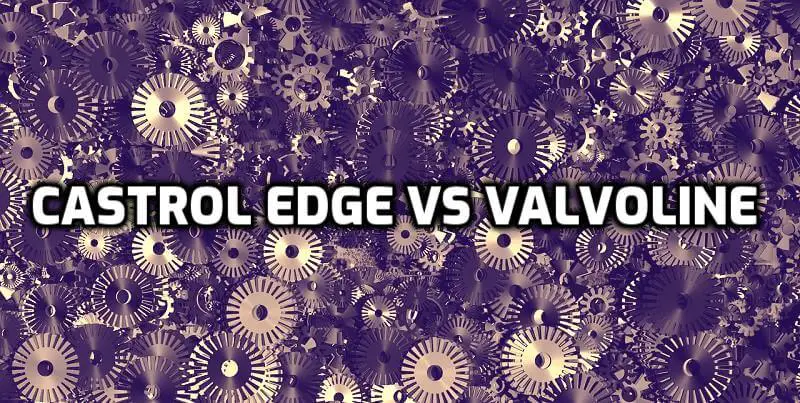Castrol Edge vs Valvoline Synthetic Oil


Castrol Edge and Valvoline both offer great synthetic motor oil for your vehicle, but which one is right for you? Castrol provides an edge over Valvoline with its use of patented nanotechnology. This technology helps reduce friction in the engine while improving fuel efficiency and performance. With this technology, you can count on Castrol to provide superior protection for your car’s engine every mile!
Castrol Edge vs Valvoline Table
As the new age car engines are relatively compact, no wonder friction is one of the emerging issues regarding the engines. Synthetic motor oils are the one-stop solution to prevent needless friction, metal wear, and damage.
Castrol Edge | Valvoline Oil |
Full Synthetic Motor Oil | Advanced Full Synthetic Motor Oil |
Excellent High Temperature Performance | Exceptional High And Low Temperature Protection |
Better Wear Protection | Design For Wear Protection Than Industry Standard |
Provides Maximum Engine Performance | It Provides Maximum Performance And Longevity For Your Engine. |
Reduces Metal To Metal Contact | Innovative Additive Technology |
Excellent Sludge Protection | It Help Fight Sludge And Deposits |
Meets Ilsac Gf-6 To Prevent Low Speed Pre Ignition | Meets The API SP Classification Protecting |
Castrol Edge Is Engineered With Fluid Titanium Technology | Advanced Protection For Hardworking Cars, Trucks And Suvs |
Why Compare?
Castrol 0W-40 and the Valvoline 5W-30 have taken the engine oil market on storms; everyone is gushing over these two products. All the internet platforms have been flooded with a requested comparison between them. And before investing, users must know the ins and outs of both variants.
Thus, this content illustrates the core differences between these two popular fully synthetic engine oils. The aim is to let the buyer know the alterations of the oils’ features, efficiency, durability, and functions. Stay tuned to grab more.
The main difference between Castrol Edge and Valvoline is that Valvoline Full Synthetic motor oil protects your engine by fighting off the critical causes of engine problems like heat and wear. Castrol Premium Synthetic motor oil protects your engine with its ultimate strength and ability to bear harsh conditions.
Viscosity Level
Viscosity level is fundamental as it determines the flow resistance of an oil. The numbers can determine the oil viscosity as in 0w40 and 5w30. Here, W refers to winter, and the precedent number indicates the oil’s resistance to freezing temperature as 0 degrees Celsius. The lower the number, the thinner the oil is in winters. And the number after W recommends the thickness of the oil at 100 degrees delicious hot temperature.
The Castrol 0w40 is thinner, which means it has low viscosity, and the Valvoline 5w30 is thicker and has high density. Though considering the viscosity level, both are great, Valvoline 5W30 does wonders for compact engines needing additional lubrication.
Performance in Different Weather
As both the oils are multigrid, they are compatible under any weather. To compare the better one, let’s deeply dig into the details. The Castrol 0W40 is thinner; unusually, oils tend to thicken during winter. Thus this more delicate oil can pump up even during the coldest temperature.
No matter how cold the environment gets, this oil can start working quickly. And the heat tends to thin the oils. And as the oil is already thin during summers, it is likely to be thinner.
So, The Castrol 0W40 is appropriate for the winter and cold parts of the world. Even the manufacturers also focus on the composition for European regions. On the contrary, The Valvoline 5W30 is thicker in consistency but not too thick to go through difficulties during winters.
It can simultaneously ensure the same efficiency and lubrication during winters. And this takes time to lose its thickness even in extreme heat, and there it strikes in hot weather. The Valvoline 5W30 is considered to be the universal oil when it comes to the performance parameters in different temperatures. It is widely used in Indian subcontinents and Africa and is also famous in cold areas.
Friction & Wear Protection
The intensification of pressure within the engines accelerates the occurrence of friction. And continuous friction leads to 10% wastage regarding engine performance. It can also cause overall engine deterioration and even complete engine damage. The Castrol 0W40 is backed with Fluid TITANIUM Technology to prevent friction.
To be precise, the molecular structure of titanium creates a temporary cushion within the engine’s interior and protects the part from damage. This technology decreases robbing friction by up to 20%. The Valvoline 5W30 comes with groundbreaking additives and is proven through (the industry Sequence IVA wear test) to be 50% more wear protection than contemporary oils.
Deposit Prevention
Castrol 0W40 is composed of detergents and antioxidants and claims to prevent the deposit of unburned or partially burned particles, debris, fragments of engine wear, metal wastage, etc., with its innovative Syntec Power Technology.
Valvoline 5W30 uses detergents and thermal properties to reduce sludge deposit building and maintains the overall engine quality.
Drain Interval
Drain interval is the indication of fuel change determined by the manufacturers. Drain interval is measured in two ways Miles and Time. For Castrol 0W40, the drain interval is around 10,000 to 15,000 miles or six months under everyday driving. And for severe or rough driving, oil changes can be more frequent.
The Valvoline 5W30 has a drain interval of three months and 3000 miles on average driving. But the brand recommends that driving 10 miles a day or starting the engine rigorously can result in frequent oil changes. Again, the brand claims that appropriate usage can even lead the drain interval to 150,000 miles.
Can You Mix Castrol and Valvoline?
While mixing two multi-grade oils to maximize the outcome is pretty cool, the same does not go for these two different brands. No one should ever mix oils for two other brands as they mainly differ in build composition and lab standards. Henceforth, the two multigrid can be combined but only with the same brands.
Can You Use Castrol 0W40 as an Alternative to Valvoline 5W-30?
Castrol 0W40 is undoubtedly one of a kind in its quality and performance excellence. The lubrication techniques, wear protection, and deposit prevention is extraordinary. Yet, it lacks efficiency in hot weather or heated engines.
And the Valvoline 5W30comes in handy in both temperatures. If the engine manufacturer recommends Castrol 0W40 and is not supposed to expose the engine in hot weather, you may use the Castrol 0W40. But replacing it with the Valvoline 5W30 would not be a wise thing to do.
Conclusion
The Valvoline 5W30 is thicker in consistency but not too thick to overcome difficulties during winters. It can simultaneously ensure the same efficiency and lubrication during winters. And this takes time to lose its thickness even in extreme heat, and there it strikes in hot weather.
The Valvoline 5W30 is considered the best engine oil for both normal and hot weather. At the same time, Castrol 0W40 is only best when it comes to cold weather. And it is not as good as the Valvoline 5W30 in hot weather conditions.
Related Article


Peter Rees, your go-to car parts expert, bridges the gap between mechanics and motorists. With over decades in the automotive industry, he decodes the intricacies of vehicles in his insightful blog, steering readers toward savvy decisions and smooth rides.


